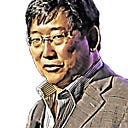It’s Never Too Late
A few years ago a student enrolls in my Stanford cloud computing class. He sends me an email asking to meet for breakfast. A few days later I’m waiting in Joanie’s Café on California Avenue in Palo Alto and a unique student shows up. It turns out he has an MD, MPH, MBA and he’s chief of pediatric cardiology at the Children’s Hospital of Orange County. I said, “I don’t know anything about what you do, so why are you talking to me?” He says he’s watched IBM’s Watson and believes AI, Big Data and Cloud computing need to meet medicine. And like any normal person he decides to enroll in the Master degree program in bio-informatics program at Stanford. It takes him 3 ½ years to finish a 2 year program because 1) he doesn’t know how to code 2) he has a full time job and 3) in his 50s he decides to adopt an 18 month old and a 6 month old — and he’s a bachelor. He’s Dr. Anthony Chang — and the lesson I learned is —
It’s never too late.
Anthony is the inspiration for the Pediatric Moonshot. In an insightful interview, he discusses the significance of the mission, highlighting its potential to revolutionize medical image interpretation across the globe. Dr. Chang, a distinguished figure in the medical field, shared a poignant story that fueled his passion for this initiative. While consulting in Myanmar, he encountered a heart-wrenching situation involving a nine-year-old girl. The lack of timely and appropriate management of her condition, due to a failure in understanding her echocardiogram, left an indelible mark on Dr. Chang. This incident, which occurred a decade ago, underscored a glaring gap in healthcare equity — the inability to interpret medical images effectively and universally.
This realization sparked Dr. Chang’s commitment to finding a solution. He envisages a world where medical images, whether an echocardiogram, pediatric head MRI, or bone image, can be interpreted accurately anywhere, regardless of the location. This dream, he believes, is closer to reality now more than ever. To achieve this, two critical elements are required: a platform for universal access to data and the integration of artificial intelligence (AI).
Connectivity serves as the foundation, ensuring that medical images can be accessed from remote or under-resourced areas. The second, more sophisticated layer involves AI. By harnessing the power of AI, we can interpret these images, bringing expertise that might otherwise be inaccessible.
Dr. Chang’s vision extends beyond just solving a technical issue; it’s about democratizing medical expertise and making quality healthcare universally accessible. His dedication to this cause is unwavering, driven by the belief that the problem he witnessed is not isolated but a challenge faced every hour, locally, rurally and globally.
The Pediatric Moonshot is more than a project; it’s a movement towards a future where no child, regardless of their geographical location, is deprived of the medical expertise they need. Anthony’s story is a powerful reminder of the potential of technology to make a real difference in the world, and his commitment to this cause is an inspiration to us all.
Listen to more podcasts at https://pediatricmoonshot.buzzsprout.com/ and register for the monthly news at www.pediatricmoonshot.com.
